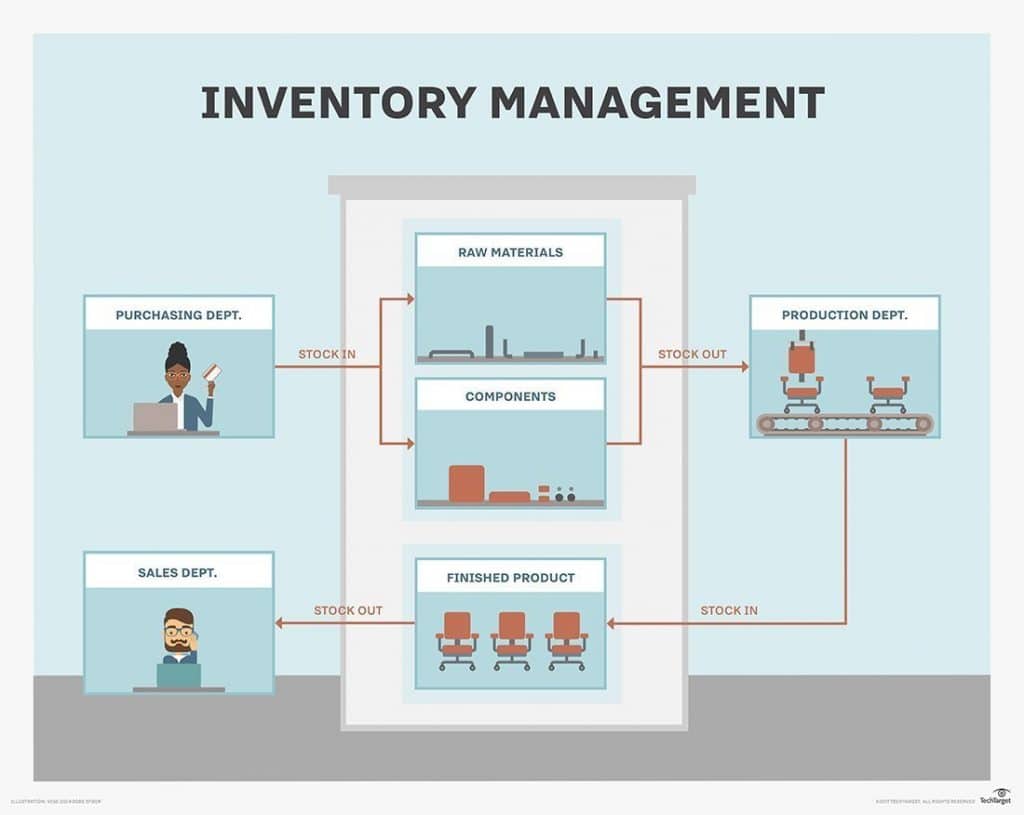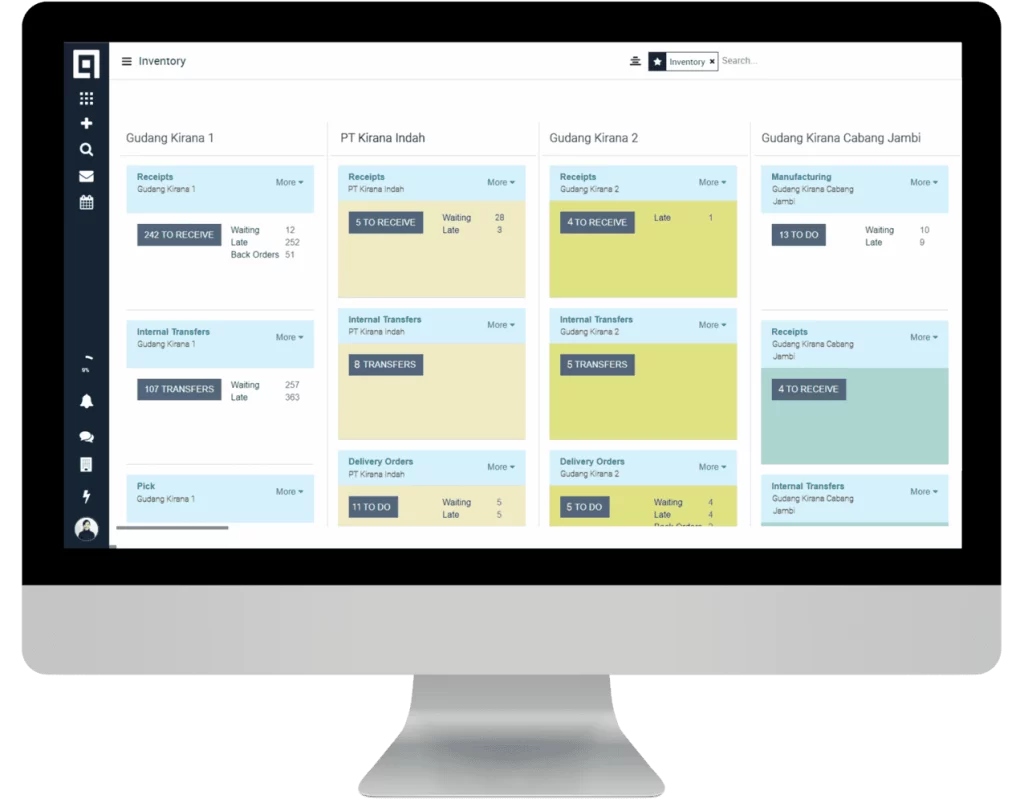Nowadays, many companies have chosen ERP system inventory management software to handle the company’s inventory items. Established businesses will need more raw resources or production supplies. As a result, the company will need to enlarge its warehouse. These items are in the inventory.
Complicated systems make human management of inventory items impractical. This strategy can lead to fatal errors, which might hinder the company’s progress. Multiple departments, including finance, planning, logistics, and operations, use ERP software for the inventory management system.
Businesses that have implemented an ERP system inventory management software will be able to effectively manage raw materials, resulting in increased profit later. In this article, we will talk more about the main benefits that you will get from using ERP system inventory management software for your business!
Table of Content:
Table of Content

Overview of ERP System Inventory Management

For businesses of all sizes, the availability of materials is an important part of the manufacturing process. Because goods must be available at all times to keep the production process going. The raw materials are in warehouses before we put them in stock storage. The materials will then be moved to where the production will take place.
After processing, the items need to be returned to the goods storage procedure. With all of these complicated activities, manual processes are more likely to make mistakes, such as input errors about the availability of materials or other small problems that can slow down production. As a result, businesses that do a lot of work need software that helps them keep track of inventory items.
What Is ERP Inventory Management?
ERP inventory management is a comprehensive system within Enterprise Resource Planning (ERP) that enables businesses to oversee various aspects of their operations through a unified platform.
It encompasses inventory, financial management, planning, logistics, and operations. With an ERP inventory management system, organizations have access to real-time inventory data across the entire enterprise.
This functionality is crucial for businesses aiming to scale, manage intricate workflows or supply chains, implement advanced automation, operate on a “just in time” basis, handle diverse product lines, or optimize their inventory investments.
It is the job of a business to keep track of how many things they have on hand. When it comes to inventory management today, software-based systems or technologies such as cloud based inventory solutions are more important than manual methods. These cloud based inventory systems enhance accessibility, improve real-time data accuracy, and allow businesses to manage stock seamlessly across multiple locations.
Benefits of ERP Inventory Management System
It is not news that implementing an ERP system inventory management software can provide numerous benefits to a business. When you use manual methods or spreadsheets to keep track of your inventory, you may end up making mistakes.
But if this happens repeatedly, this can have a big impact on your company’s operations. At this time, it’s a sign for you to start using the ERP system to track your inventory.
ERP systems will assist in presenting pertinent data that will help people understand how the company is doing to provide better decision-making in the future. ERP system inventory management software can also have more benefits, like the ones below:
1. Enhanced effectiveness
Making use of an ERP system to manage inventory will help cut down on the time it takes to collect data, which will make production and other processes run more quickly.
There is a lot of work that goes into inventory management systems, but the use of the software will make them easier.
Another benefit is that employees will be more productive, and reports of inventory will be made in real-time.
2. Transparency in the supply chain
ERP software for inventory management systems can assist in inventory item alignment. This system can also coordinate between suppliers and manufacturers, allowing for software-based tracking of the shipping process.
Furthermore, it can synchronize shipping, inventory, and order data in the field of Supply Chain Management.
3. Enhancements to reporting
The accurate inventory data can help us make better decisions when we make them. This is because the data presented will help you figure out which SKU is best, how much it costs to sell, and how people buy from each location and channel. It’s possible to say that ERP systems can make reports that show how a business is doing.
4. Savings on costs
The efficiency gained through the use of an ERP system inventory management can result in cost savings. Human error, unnecessary purchases, and excessive stock storage almost never occur, thereby avoiding financial losses. The reduction of resources used will assist the company in incurring excessive costs, thereby increasing profit.
5. Inventory planning
The ERP system keeps a record of each product or inventory item, which makes it easier to keep track of how much stock there is. Inventory management isn’t just for one person: Employees, partners, and even customers can see how many goods are available.
The data is also real-time, which means that looking at the stock of goods doesn’t take a long time or require a lot of math. This efficiency can help customers be more satisfied and help with planning for the future when it comes to stocking goods or making things.
Also read: Optimize Your Business with Project Management Software
Conclusion
The preceding five points are factors that large entrepreneurs examine when deciding to utilize an ERP system for inventory management. Inventory management is very important for a business to stay alive.
Effective presentation of stock product data is important for both the company and the customer. Furthermore, it has been shown that businesses can run more smoothly when they use the software.
Established businesses have benefited from HashMicro’s inventory management software. HashMicro software has a significant advantage because it has ERP system inventory management software for any business needs. You can start HashMicro’s Inventory Management Software demo for free now.
{ “@context”: “https://schema.org”, “@type”: “FAQPage”, “mainEntity”: [{ “@type”: “Question”, “name”: “What is the difference between ERP and inventory management system?”, “acceptedAnswer”: { “@type”: “Answer”, “text”: “An ERP is gigantic in its feature set compared to inventory software. It is also much more expensive and less flexible, so it is aimed at large corporations instead of small businesses. Inventory software can integrate with other business solutions to approximate the features of an ERP at a fraction of the cost…” } },{ “@type”: “Question”, “name”: “What The Benefits of Utilizing an ERP System Inventory Management”, “acceptedAnswer”: { “@type”: “Answer”, “text”: “1. Enhanced effectiveness 2. Transparency in the supply chain 3. Enhancements to reporting 4. Savings on costs 5. Inventory planning 6. Enables business expansion … ERP” } }] }





































